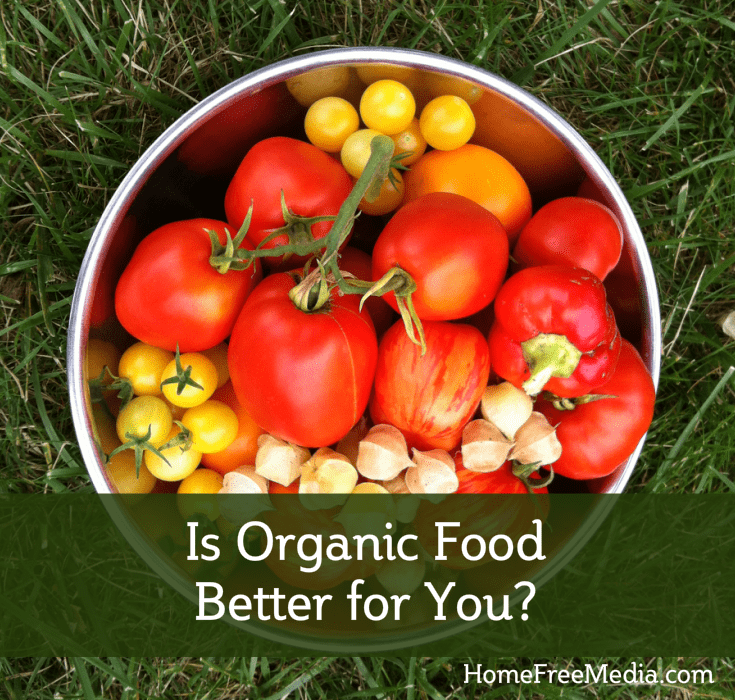
Is Organic Food Better for You?
Organic food has come from sitting on shelves of only selective stores to the point where it is now available at most supermarkets. Is this because of the genuine benefits of organic produce, or because of the savvy marketing of organic food growers and distributors?
Have the health conscious people in their eagerness to find a healthier alternative overvalued the virtues of organic food items? In this article, we are going to look at the phenomenon from different perspectives.
What Is Organic Food?
In order to measure accurately the merits of organic foods, it is important to understand what the word “organic” means. “Organic” is the word that is used for describing produce that has been grown using certain agriculture practices.
The standard and conditions that have to be met before marketing a product as organic are set by different authorities all over the world. The U.S. Department of Agriculture (USDA) has a certification program that requires products and produce to meet strict standards before they can be labeled and marketed as organic.
Is Organic Food Better For Health?
What Are The Benefits? A practice that is potentially important for the consumers is the prohibition on use of all artificial pesticides. However, use of natural pesticides and fungicides is allowed.
Some people do have revolting thoughts when they realize that the healthy apple they are about to eat is full artificial chemicals that might be dangerous. Hence, they opt for organic apples.
Now the question arises, is the organic apple free from pesticide residues?
In addition, are the residues in the conventional apple harmful if they are under the maximum limits set by the regulating authorities? Even if it’s not, some people might still prefer it because of the misconception that “natural” is safer. This is not necessarily true; ingesting “natural” pesticide residues can also have negative consequences.
Some of the natural pesticides also have a greater negative impact on environment than their artificial counterpart.
Another point that needs to be taken into consideration is that a farmer might have to use several different natural pesticides to have the same effect of a single artificial pesticide.
Does this mean that organic farming is a scam?
No, it does not.
The basic idea behind organic farming is a novel one. However, just because a product is labeled as organic, doesn’t necessarily mean that it is better.
The benefits will depend on the farmer.
A farmer might have tried effective alternative methods to control pests, and the produce might actually be better in terms of harmful residues.
What Studies Have Shown
Some studies have shown that organic foods do indeed have lower pesticides residues. However, the residue levels in both organic and conventional produce were lower than the maximum permissible limit set by the authorities.
As of now, the possible health benefits of even lower residues levels in organic produce are unknown and unverified.
The Nutritional Profile Of Organic Foods
What about the nutritional profile of organic foods? Do they offer any extra nutrients?
Studies are divided on this, some have shown that they do, others didn’t come to the same conclusion. However, the difference in most nutrients overall was only marginal.
Therefore, even if they do, the positive impact of those extra nutrients will be minor, if at all.
Another misconception that some people have is that organic produce will not contain harmful microbes. This is not true.
Organically grown produce has the same percentage of contamination as conventional produce. In fact, some studies have shown that there is an additional risk of contamination in organic produce.
Therefore, don’t be casual while handling organic produce. Use the same caution you have would used for the conventional produce.
Arguments For Organic Produce
Many nutritionists, one famous one, Ellie Krieger from the Food Network, recommend organic produce.
Many people belong to special organic coops that are ran by farmers for locals in the neighborhoods and these are spreading in popularity.
Major supermarkets are beginning to offer organic produce sections more and more.
And, if you have ever bit into an unwashed fruit or vegetable, the bitterness that you get as compared to when it’s washed is quite noticeable, so, those pesticides do make a difference in taste.
Many experts and consumers are convinced that organic is just plain better for health.
Arguments Against Organic Produce
Considering the issue from different topics, the conclusion is that there is insufficient evidence to claim confidently that organic is better.
It also costs more.
We do need better farming methods, but organic farming is not the ideal solution, and conventional farming is not truly the evil it is portrayed to be.
Bottom Line
So, what can we conclude? Is organic food better for you?
A method that takes the best from both the worlds to maximize yield without the use of possibly dangerous substances, artificial or natural, is what is required.
In the end, the individual must choose, and go with what they believe is right for themselves and their families.
See also:
Ten Great Vegetables for Your Home Vegetable Garden
Choosing the Right Type of Gardening for You
The New Self Sufficient Gardener
Raised Bed Vegetable Gardening
 A Message from Norma...
A Message from Norma... In case you're curious, I started working online in 1997 - in the dinosaur days of the internet. My purpose here at HomeFreeMedia is to help YOU build the business of your dreams by developing and recommending top quality products and tools. This will also result in profit and affiliate commissions for me, so we both win!
Sign up here for news and special offers.
Please note that some products are not exclusive to HomeFreeMedia so that you don't make duplicate purchases.